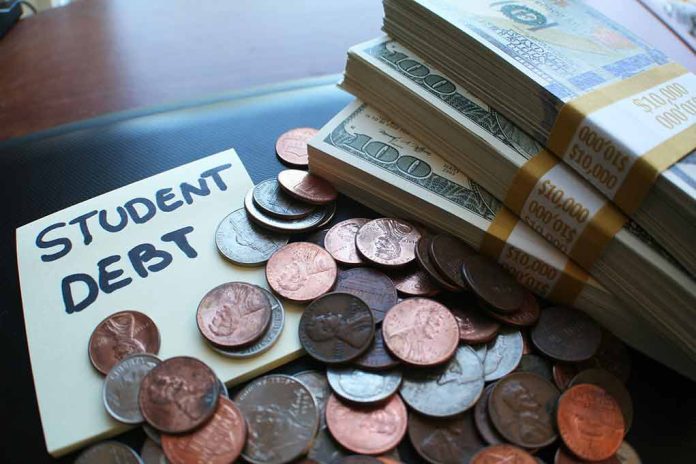
The U.S. 8th Circuit Court of Appeals has dealt a significant blow to President Biden’s student debt forgiveness plan, effectively blocking the SAVE program and potentially impacting millions of borrowers.
Top Takeaways
- The 8th Circuit Court of Appeals has blocked Biden’s SAVE plan, which aimed to forgive $500 million in student debt.
- Judge L. Steven Grasz ruled that Education Secretary Miguel Cardona exceeded his constitutional authority with the SAVE plan.
- The ruling prevents future presidents from implementing similar student loan forgiveness plans.
- Millions of borrowers may face higher monthly payments if forced to switch to less generous repayment options.
- The decision sets a significant precedent that could hinder similar presidential initiatives in the future.
Court Strikes Down Biden’s Student Loan Forgiveness Plan
In a decisive ruling, the U.S. 8th Circuit Court of Appeals has effectively ended former President Joe Biden’s ambitious student loan forgiveness plan. The court determined that the Secretary of Education had overstepped his authority in designing the SAVE (Saving on a Valuable Education) plan, which aimed to forgive $500 million in student debt. This decision follows a previous Supreme Court ruling that had already denied the Biden administration’s efforts to lift a block on the plan’s enforcement.
Missouri Attorney General Andrew Bailey, who spearheaded the legal challenge against the Biden administration, hailed the court’s decision as a victory for working Americans. The ruling not only blocks the SAVE plan but also sets a precedent that could prevent future presidents from implementing similar student loan forgiveness initiatives without explicit congressional approval.
BREAKING: Court Rules Biden’s Student Debt Plan ILLEGAL!
A U.S. appeals court ruled that Biden had no authority to push his student debt relief plan, which aimed to lower payments and speed up loan forgiveness – Reuters pic.twitter.com/UTc0XpXWFS
— Libs of TikTok (@libsoftiktok) February 18, 2025
Impact on Borrowers and Taxpayers
The SAVE plan was designed to lower monthly payments for over 8 million borrowers, with some qualifying for zero-dollar payments. According to the Biden administration, the plan could have reduced monthly costs and provided forgiveness after 10 years for certain borrowers. However, critics argued that the program would shift the financial burden to taxpayers, with the Penn Wharton Budget Model estimating a cost of $475 billion over the next decade.
“Though Joe Biden is out of office, this precedent is imperative to ensuring a President cannot force working Americans to foot the bill for someone else’s Ivy League debt,” said Bailey.
The court’s decision extends beyond the SAVE plan, potentially affecting other income-driven repayment (IDR) programs. Millions of borrowers may now face higher monthly payments if forced to switch to less generous repayment options.
Legal and Political Implications
Judge L. Steven Grasz, in his ruling, stated that the Education Secretary had “gone well beyond” his statutory authority. The court’s decision emphasized that Congress has been explicit when authorizing loan forgiveness in the past, and the SAVE plan lacked such clear legislative backing.
“We are hard-pressed to conclude that Congress, by directing the Secretary to enact a repayment plan with varying payments based on income over a period not exceeding twenty-five years, believed it authorized the Secretary to wipe out any remaining principal or interest of any borrower in as few as ten years of low or no payments,” wrote Judge L. Steven Grasz, outlining the court’s opinion.
This ruling is part of a broader debate over student debt relief, with significant political implications. Congressional Republicans had accused the Biden administration of using debt forgiveness to gain votes before the 2024 election. Meanwhile, Congress is considering proposals to repeal SAVE and existing IDR plans, potentially replacing them with a system that eliminates loan forgiveness altogether.
The Biden administration had vowed to continue defending the SAVE plan, claiming that it would benefit millions of borrowers. However, this latest court decision as well as the change of administration has all but eliminated any possibility of any debt forgiveness.






















